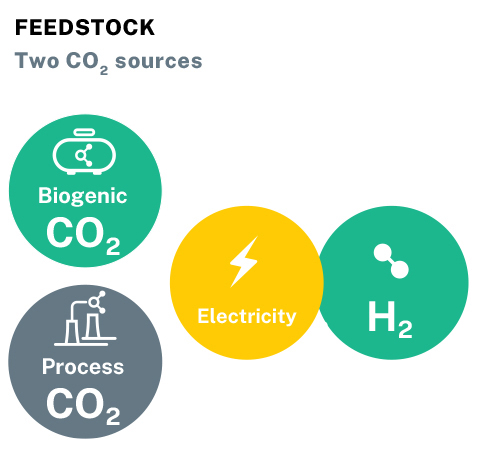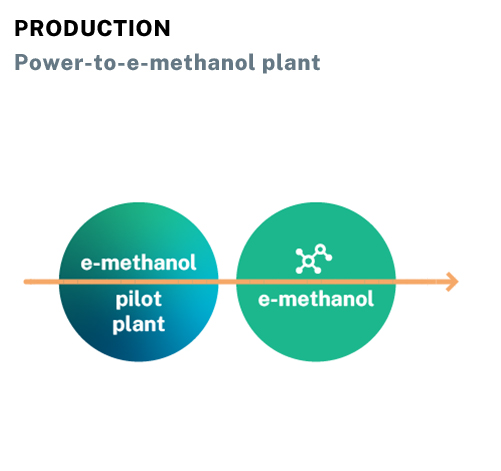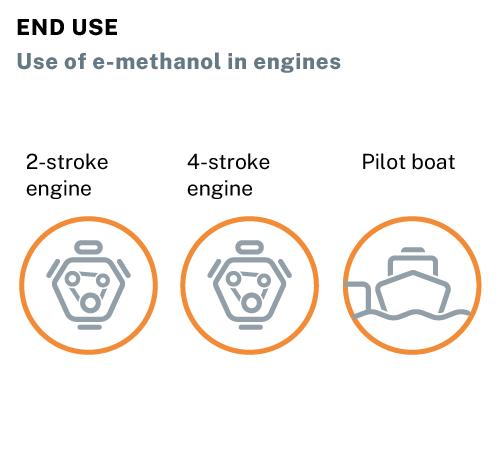x
Background anD objectives
Background
The majority of marine fuel used worldwide consist of either petroleum or natural gas, both of which contribute to greenhouse gas (GHG) emissions. To address this environmental concern, new regulations like FuelEU maritime require shipowners to decrease the carbon intensity of their vessels.
Renewable fuels such as ammonia, methane or methanol made from renewable sources are seen as promising decarbonisation options. Synthetic methanol, also known as e-methanol, has several key advantages over other renewable fuels: it is liquid at normal pressure and engines can be easily converted to burn e-methanol. The deployment of e-methanol as fuel in shipping is gaining momentum in EU with leading shipping companies ordering new built vessels operating on this renewable fuel.
Currently, the renewable fuels value chain faces several obstacles: there is competition between different sectors for feedstock, renewable fuels are only produced in limited quantities, and the cost of renewable fuels remains high. The POSEIDON project will help address some of the existing barriers to mainstream the use of e-methanol as fuel in shipping.
Project objectives
The overall goal of the POSEIDON project is to prepare the implementation of local value chains based on e-methanol as fuel for shipping in the ports of Valencia and Thessaloniki. POSEIDON’s main objectives are as follows:
- to build and test an innovative TRL7 e-methanol pilot plant based on a novel concept,
- to establish two communities of practice in Thessaloniki and Valencia to collect feedback and strengthen collaboration at local level,
- to assess impacts of the value chain implementation through detailed technical, economic, environmental and social studies,
- to develop roadmaps outlining the steps to be taken to implement the value chain in Valencia and Thessaloniki and in other EU ports after project end,
- to promote public acceptance of the POSEIDON solutions by regularly sharing project progress and achievements with academia, industry, policy makers.
Build and demonstrate efficient and suistainable solutions for the “e-methanol as fuel for vessels” value chain
- Perform engineering studies and develop a digital twin of the e-methanol plant
- Build a e-methanol pilot plant and a dedicated test platform
- Integrate the pilot plant in the test platform and run tests
- Test the produced fuel in 2- and 4-stroke engines and a pilot boat
Connect stakeholders and lay the foundations of a cost-effective and sustainable e-methanol value chain for shipping
- Identify current value chain barriers and derive mitigation measures for e-methanol uptake in shipping
- Establish local communities of practice (COPs) to foster collaboration and co-create results
- Define realistic value chain scenarios representative of the local context in Valencia and Thessaloniki
Evaluate the impacts and evidence the value creation along the e-methanol value chain
- Develop a modeling tool to evaluate various e-methanol based value chain scenarios
- Run detailled technical, economic, environmental and societal studies to assess the impacts of the various scenarios
- Identify the most promising scenarios and provide recommendations for future value chain implementation
Pave the way for market uptake and future deployment of e-methanol in the EU
- Develop a deployment roadmap for e-methanol as fuel in EU ports
- Draw up policy recommendations to ensure an enabling environment for e-methanol in shipping
- Investigate value to be created and business models for the different steps of the value chain
- Release a replication tool allowing interested parties to simulate their own vaue chain scenario
Foster the adoption of emethanol as an alternative fuel for ships through targeted communication, disseminaton and exploitation actions
- Develop a communication toolkit to raise awareness of the project and its objectives
- Publish open access dissemination materials to share knowledge and promote innovation
- Organise events to showcase the developed technologies and their capabilities
- Define an exploitation roadmap to ensure future commercial and scientific use of POSEIDON outputs

Explore the key insights and future directions of the Poseidon Project as shared by our Project Coordinator.
Learn how our innovative approaches are shaping a sustainable future. Read the full article for an in-depth look at our progress and vision.
Main innovations and expected impacts
Main innovations
- TRL7 e-methanol pilot plant that uses H2 and CO2 as feedstocks
- Power-to-X test platform to test the pilot plant and produce e-methanol for fuel tests
- Qualified 2- and 4-stroke test engines and a pilot boat to run on e-methanol
- Modeling tool to evaluate various e-methanol based value chains from technical, economic, environmental, and social points of view
- 2 communities of practice in Thessaloniki and Valencia involving local stakeholders to support the future implementation of value chains
- Deployment roadmap to roll-out e-methanol-based value chains for shipping in EU
E-methanol for shipping value Chain



Expected outcomes
- Improved renewable fuel technologies: more cost efficient and performant technologies for e-methanol production, storage, distribution and end-use based on EU research and innovation
- Value chain implementation: two value chains implemented in the ports of Thessaloniki and Valencia based on POSEIDON research outputs
- E-methanol becomes a standard marine fuel: new built maritime ships equipped with 2-stroke and 4-stroke e-methanol engines
- Ports as e-methanol hubs: deployment of an infrastructure for e-methanol production, storage and distribution in the main EU ports
- Enabling environment: favourable regulatory framework and new standards for the use of e-methanol onboard ships and the safe production, transport and distribution of renewable fuels in EU
- Social acceptance: EU citizens are better informed about the benefits of e-methanol as renewable marine fuel thanks to a targeted communication campaign



